Section 3: LITHUANIA TODAY
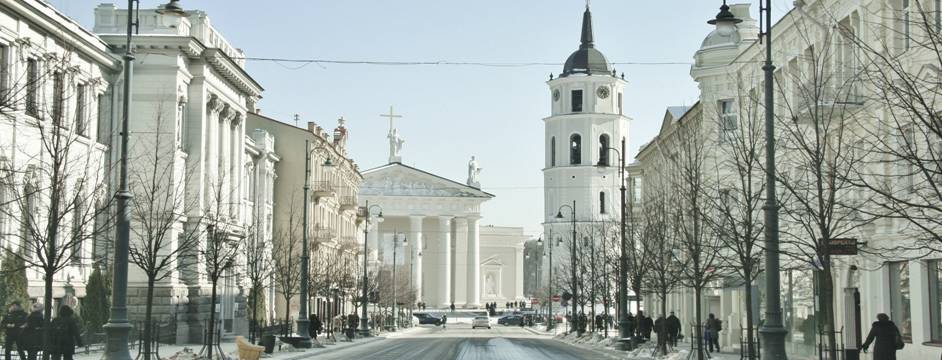

THE VOICE OF INTERNATIONAL LITHUANIA
|
VilNews has its own Google archive! Type a word in the above search box to find any article.
You can also follow us on Facebook. We have two different pages. Click to open and join.
|
Tue, 20th December, 2011 - (7) Comment
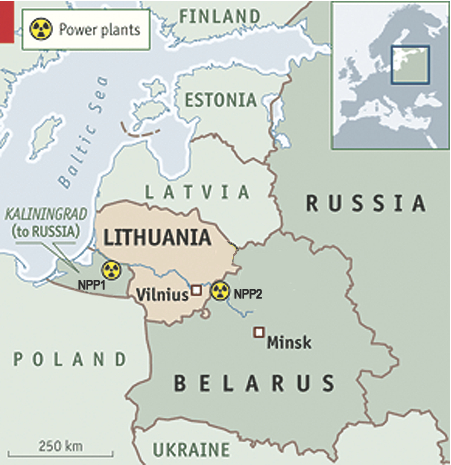
Kaliningrad and Belarus nuclear power plants. (NPP1 and 2)
on the border of Lithuania.
Prepared by:
Dr. Stan (Stasys) Backaitis, P.E., SAE Fellow1
Lithuanian American Council
One NPP containing two reactors, will be situated in Astravets, Belarus, approximately 20 km (12 miles) east of Lithuania and about 50 km (31 miles) from its capital city of Vilnius. The other set of two reactors will be constructed in the Kaliningrad enclave approximately 10 km (6 miles) south and west of Lithuania’s border. (The Kaliningrad enclave is a small patch of Russian-administered land wedged between the European Union nations of Poland and Lithuania.) In case of a nuclear disaster, the two NPPs pose a grave danger to Lithuania and other North-European countries.
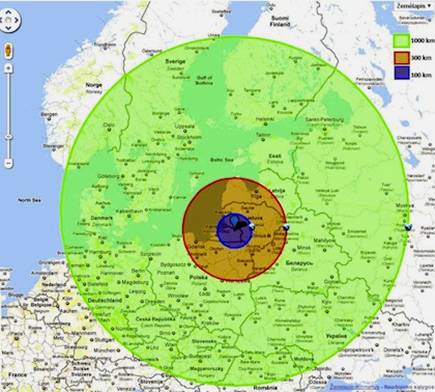
Zones of nuclear endangerment by the Kaliningrad nuclear power plant.
Mon, 12th December, 2011 - (1) Comment
A LETTER FROM MASHA KAMENETSKAYA, ONE OF MANY
PROTESTERS IN ST. PETERSBURG, RUSSIA, LAST SATURDAY
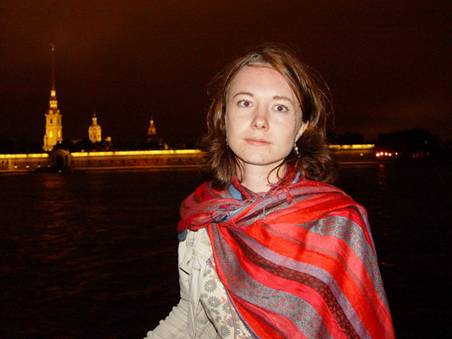
This is a letter from Masha Kamenetskaya, a young journalist and writer from St. Petersburg, Russia. She is describing her participation in the evening after the 10 December protest for fair elections in the city on the Neva.
SATURDAY 10 DECEMBER 2011: Finally I am home -- after a good and such a... real day. Even a romantic one, in some sense, when you feel that you have done the right thing in the right place.
I spent the day with my friends and loved ones -- who would have thought that a meeting of protest can be such a great occasion to see friends and to catch up with them? And I spent the day with the people living in the same city as I do. The people who smiled and who cared.
The day started with snow (in which some people saw the symbolic connection with the symbolic “against the war” white ribbons and white flowers worn and carried by the meeting participants), continued with lunar eclipse (have you heard of it? it took place an hour before the meeting in question on Pionerskaya Square), reached its pinnacle in the square itself, and ended with me at the theatre.
You want to know about the meeting, of course. While we were walking there, I saw quite a few people, those who supported one of the peaceful ideas for the meeting and who carried white carnations; police women jumping out of their cars like snowflakes; old-aged people, accompanied by their grandchildren -- all headed there. And I saw hundreds and hundreds of others, too. .A helicopter was spinning above the Kazan cathedral. OMON [special security forces -- auth] trucks were "hidden" from view just around the corner. There were also internal-security military vehicles there, too, with, probably, lots of soldiers inside -- but over the course of the day, we never once saw any Army soldiers.
Sat, 10th December, 2011 - (1) Comment

2011 has been the year when people around the world began to speak up. Leaders in many countries, be it in politics, finance or other areas, have this year been forced to realize that it no longer is possible to deceive their citizens. In some countries the protests have evolved into revolts, often bloody, in which state leaders have been forced to abandon their posts.
But people in Lithuania have not reacted like that, despite the fact that the downturn and tightening measures they have been exposed to probably have been the worst and toughest in Europe.
Here in this country the elderly people sit in their small, dark apartments and suffer themselves quietly through catastrophic difficult time after their already minimal pensions were drastically cut, while prices for heating, electricity and food continue to rise.
Nor do the young take to the streets to protest against the injustice they are exposed to. Instead, they pack their suitcases and leave their home country. Many probably forever. 350 persons per day are now leaving, I have been told.
“Before they realized what is going on and who was robbing them, the Lithuanian people got clubbed by PM Kubilius’ ambitious austerity policy and the younger ones started emigrating in catastrophic numbers, seeing no future in the country whose GDP was reduced (from a low post-Soviet level) by some 20% by the combination of the old nomenklatura rent-seeking policies and the global Great Recession. Lithuania is hollowing out, unfortunately,” wrote Dr. Val Samonis in an article here in VilNews last April, concluding that “the Greeks won, the Lithuanians lost!”
Sat, 10th December, 2011 - (1) Comment
Russia is seeing the largest show of public anger in the country since the collapse of the Soviet Union 20 years ago. The centrepiece is massive rallies in Moscow, with more than 30,000 people demonstrating. But protests take place in more than 70 other cities in the sprawling country.

Apart from silencing opponents and enriching personal friends, the one thing Vladimir Putin was really good at was fixing elections. In this, he had a perfect track record since March 2000—until last Sunday. The Russian parliamentary election on December 4th was neither free nor fair. Several opposition groups had been barred from the ballot; officials pressured voters to support the ruling party; the vote-count was marred by ballot-stuffing and the rigging of protocols. But even in these conditions—and even by the official figures—most Russians voted against Vladimir Putin. His party, United Russia, received 49.3 percent of the vote, losing its two-thirds supermajority in Parliament for the first time in eight years. Compared to the last poll in 2007, when it registered 64.3 percent, United Russia’s result represents a net loss of 13 million votes and 77 seats in the 450-seat Duma (down from 315 to 238).
Thu, 8th December, 2011 - (2) Comment
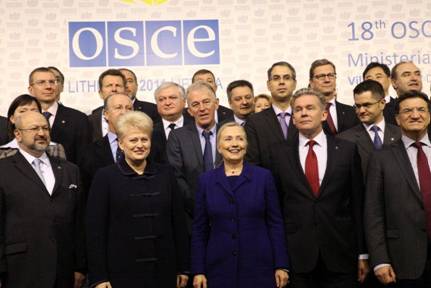
U.S Secretary of State Hillary Clinton and President Dalia Grybauskaitė fronted the OSCE conference in Vilnius this week.
By Mark Kurosky
mark.kurosky@gmail.com
This week The Republic of Lietuva has demonstrated its prestige and accomplishment being a contemporary world player and a voice for democracy taking center stage hosting the OCSE Ministerial Conference and the ESCO "Making Women's Voices Heard" convocation. Lithuanian President, Dalia Grybauskaite, must be offered kudos for assuming a leadership helm in both of these world conferences. Witnessing President, Dalia Grybauskaite, partner with and stand side by side US Secretary of State, Hillary Clinton, a woman undeniably known as the spouse of one of the most powerful men in the world in contemporary history, can only be a source of tremendous pride for Lithuanians worldwide.
During an address at the "Making Women's Voices Heard" event, and as quoted on the Lithuanian Presidential website, President Dalia Grybauskaite stated, "Any discrimination impairs the well-being of our societies. Gender gaps, glass ceilings and brick walls - an environment you navigate daily. Only through personal example and greater visibility we can attract everybody's attention to this problem and encourage combating it."
The Lithuanian President further "urged participants of the discussion to be good examples in the fight against gender inequality by assuming more responsibility in decision making, showing personal initiative, efforts, and persistence. She underlined that only public and vocal messages about gender equality issues could encourage women to be more determined in the struggle for their rights". The President praised Lithuania's efforts in the protection of women's rights and claimed Lithuania's example of such "good practice".
In stark contrast to the foregoing, and under the witness of the world's center stage spot light, one must then ask how President, Dalia Grybauskaite, the members of the Lietuva Seimas, and the contemporary, educated Lithuanian society at large, can not only tolerate, but actively promote openly stated discrimination toward gays, lesbians, bisexuals and transgendered members of Lithuanian society.
Mark Kurosky
 I am a 54 year old, gay male, a Lithuanian American, second generation born in Scranton, Pennsylvania in 1957, and I now reside in Prescott, Arizona. My grandparents immigrated from Lietuva in 1910, from Kacergine and from Miroslavas. I grew up immersed in Lithuanian culture, I am fluent in the language, have traveled Lietuva, and have family still within the country. My dream is to return to reside, work and thrive in Lietuva, however, for me most personally as a gay man, I feel that the atmosphere there would be unsafe, inhospitable, and uncomfortable. And I find this to be a shame as I would love nothing more than to go home to my beloved motherland.
I am a 54 year old, gay male, a Lithuanian American, second generation born in Scranton, Pennsylvania in 1957, and I now reside in Prescott, Arizona. My grandparents immigrated from Lietuva in 1910, from Kacergine and from Miroslavas. I grew up immersed in Lithuanian culture, I am fluent in the language, have traveled Lietuva, and have family still within the country. My dream is to return to reside, work and thrive in Lietuva, however, for me most personally as a gay man, I feel that the atmosphere there would be unsafe, inhospitable, and uncomfortable. And I find this to be a shame as I would love nothing more than to go home to my beloved motherland.
Thu, 8th December, 2011 - (0) Comment
Lithuanian Foreign Ministry “regrets that some senior diplomats in Russia’s MFA continue to operate in last century’s spirit of falsification of history.”
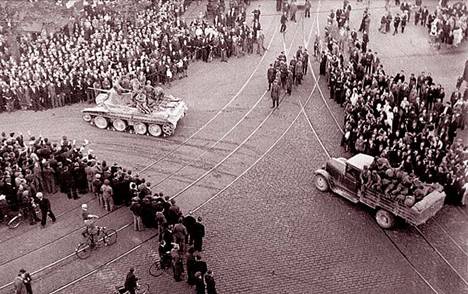
Red Army tanks enter Riga in1940.
Photo: wikipedia.org
On December 1 and 2, respectively, Lithuania’s and Estonia’s ministries of foreign affairs (MFAs) refuted the Russian MFA’s latest claims that the three Baltic States (Estonia, Latvia, and Lithuania) had voluntarily joined the Soviet Union in 1940.
Moscow’s claims in this regard are hardly new; but are being resurrected in the context of Russian-fanned tensions with the US and NATO over European security, and are presented with some new twists to the old arguments. In a radical historical innovation, Russia’s MFA statement further claims that the present-day Republic of Moldova is a Russian land (see below).
Lithuania and Estonia chose to reply in a low key. Lithuania’s MFA handed over a note to the Russian embassy in Vilnius, expressing
Read more:
http://www.jamestown.org/single/?no_cache=1&tx_ttnews[tt_news]=38747
Tue, 6th December, 2011 - (1) Comment
Vilnius’ mayor cracks down on beggars and givers
Why are beggars despised?"A beggar, looked at realistically, is simply a businessman, getting his living" |
 George Orwell |
By George Orwell
It is worth saying something about the social position of beggars, for when one has consorted with them, and found that they are ordinary human beings, one cannot help being struck by the curious attitude that society takes towards them. People seem to feel that there is some essential difference between beggars and ordinary "working" men. They are a race apart--outcasts, like criminals and prostitutes. Working men "work," beggars do not "work"; they are parasites, worthless in their very nature. It is taken for granted that a beggar does not "earn" his living, as a bricklayer or a literary critic "earns" his. He is a mere social excrescence, tolerated because we live in a humane age, but essentially despicable.
Yet if one looks closely one sees that there is no essential difference between a beggar's livelihood and that of numberless respectable people. Beggars do not work, it is said; but, then, what is work? A navvy works by swinging a pick. An accountant works by adding up figures. A beggar works by standing out of doors in all weathers and getting varicose veins, chronic bronchitis, etc. It is a trade like any other; quite useless, of course--but, then, many reputable trades are quite useless. And as a social type a beggar compares well with scores of others. He is honest compared with the sellers of most patent medicines, high-minded compared with a Sunday newspaper proprietor, amiable compared with a hire-purchase tout--in short, a parasite, but a fairly harmless parasite. He seldom extracts more than a bare living from the community, and, what should justify him according to our ethical ideas, he pays for it over and over in suffering. I do not think there is anything about a beggar that sets him in a different class from other people, or gives most modern men the right to despise him.
Sun, 4th December, 2011 - (0) Comment
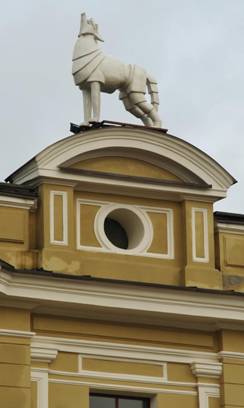
There is a legend that surrounds the founding of Vilnius in 1323. The legend has it that Grand Duke Gediminas went on a hunting trip in the holy woods of the Valley of Sventaragis. Tired after a successful day of hunting, the Grand Duke settled for the night near a hill at the convergence of the Neris and Vilnia rivers. He fell asleep soundly and had a dream. A huge iron wolf was standing on top of the hill and the sound of hundreds of other wolves inside it filled all the surrounding fields and woods. After the hunting trip, Gediminas went back to Trakai (the capital of Lithuania at that time) and consulted the pagan priest (oracle), Lizdeika, to reveal the secrets behind the dream. And the priest told him: “What is destined for the ruler and the state of Lithuania, let it be: The iron wolf means a formidable castle and town which will be established by the ruler on this site. The city will stand as strong as iron and its walls will protect the land from its enemies. The massive sound dwelled inside the wolf, symbolized the fame of the city shall echo beyond their borders and proclaim throughout the centuries the glory of Lithuania.” Gediminas heeded and pleased with the priest’s reveal of his dream. He begin to summon artisans and craftsmen around the country and Europe to design and construct his new strong and beautiful kingdom, which would surround this hill where he had the dream of the iron wolf. Upon the completion Gediminas moved his home, signaling the establishment of a new capital for his country: Vilnius.
Mon, 28th November, 2011 - (1) Comment


In the German city of Freiburg environment and economy are not antagonists. On the contrary, the environmental economy is the leading business sector in both town and region.
Thu, 24th November, 2011 - (2) Comment

My youngest daughter, then three-year-old Cornelia, with granddad Bruno.
I think people on mother Earth has bright times to look forward to;
times when the world will be managed and developed by the
new type of people, those who are now growing up.
Photo: Aage Myhre.
By Aage Myhre
aage.myhre@VilNews.com
The economic downturn has made more and more ‘experts’ come forward with gloomy predictions for the world's future.
I do not share this pessimistic attitude. I think the crisis is part of a necessary cleansing process. In this way, we live in a very exciting time. The very ‘transition time’.
I think the world’s money power and capitalism as it has been exercised is bad and unfair in many ways. I am skeptical also about many of the other 'isms'. In my opinion, greed and desire for power have defined the various 'isms' and the world for far too long.
Many of the problems they have created have been nurtured by unhealthy egoism. Money has become our god, a deceitful god. Therefore, many countries are struggling today. Many innocent people suffer as a result thereof.
Yet I am optimistic. For I see that a whole new type of people is coming. New leaders. Many of today's children and young people. What I see is forward-looking youngsters with good balance within themselves and their 'other dimension'; their divine origin.
‘The land of smiles’ is under development. The new kids, the new human type, seem to have come to Earth with a special mission: to assist the Earth and its inhabitants in the transition and the 'rebirth' as a planet with higher awareness and better interpersonal understanding.
All truth passes through three stages. First, it is ridiculed. Second, it is violently opposed. Third, it is accepted as being self-evident.
- Arthur Schopenhauer, Germantown philosopher (1788 - 1860).
Sun, 20th November, 2011 - (0) Comment

Vilnius early this morning, Sunday 20 November 2011.
Youngsters lighting candles at the Cathedral
to mourn people killed in traffic accidences.
Photo: Aage Myhre
“Hip cities that think about how they work. The story of young people, full of ambition, energy, skill and talent, moving to enticing cities that call to them like a siren’s song is as old as modern civilization. And in a world where national borders are easier to traverse, where more countries are joining the prosperous global middle class and where the cost of a one-way plane ticket is more affordable, young professionals probably have more cities to choose from than ever before.”
This is how New York Times this week introduces its article about what they consider the 10 hippest cities in the world. Vilnius being one of them.
Click here to read the New York Times article
![]()

Vilnius Mayor, Arturas Zuokas crushing
an illegally parked car with an armed
vehicle from the Lithuanian army.
Not everyone is impressed by the New York Times’ selection of Vilnius among the top ten hip cities in the world. Here are two comments from Facebook this morning:
1) “My dislike for Vilnius aside, this kind of publicity is very important and would be valuable, if only different aspects were stressed and many of the statements weren't propaganda”
2) “Oh come on, this Zuokas' neoliberalism is way overrated while his public relations drive is closer to idiocy than propaganda. I happened to get in touch with some of his apparatchiks with the city hall's PR and press offices; I'm telling you, they could barely qualify to work for a kolkhoz. The dude is very funny for an ex-convict though, a good journalistic back scratch.”
![]()

Aage Myhre,
Editor-in-Chief.
I took to the streets of Vilnius early today morning, Sunday 20 November.
It was a mysterious, misty morning, excellent for photographing. If you want to see a slide show of my early morning impressions, simply click on one of the below images:
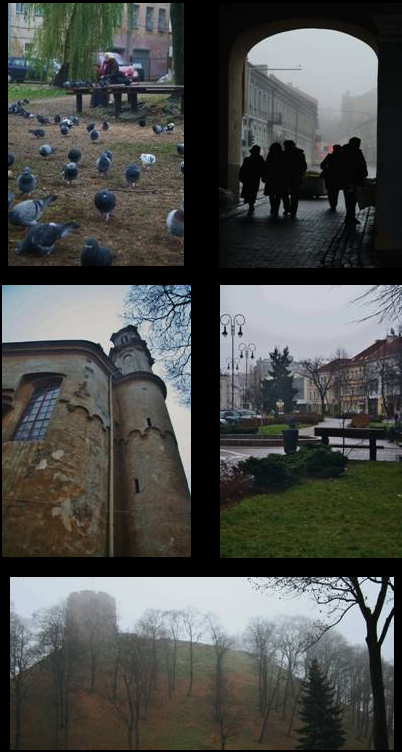
Click here to see my misty early Sunday morning slide show.…
Thu, 27th October, 2011 - (1) Comment

November 1st, people of the Christian Faith all over the world celebrate All Saints’ Day. In Lithuania it is one of the most solemn of holidays. This day is set aside as a day to honor the souls of family members that have passed away as well as remembering the Saints of the Catholic Church.
Tue, 18th October, 2011 - (2) Comment
OIL, GAS AND NOW POTENTIALLY 3 NEW
NUCLEAR PLANTS IN THE BALTIC AREA:
Ticking time bombs?
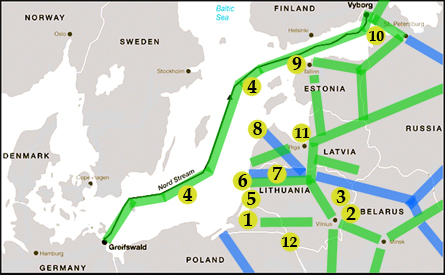
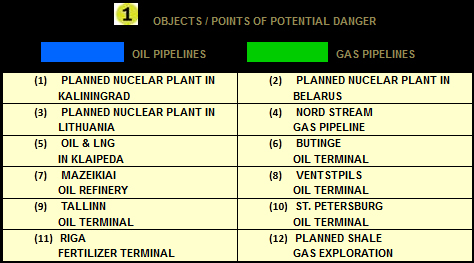
Text: Aage Myhre, Editor-in-Chief
aage.myhre@VilNews.com
It surprises me that the warning bells are not ringing much louder in Scandinavia and the rest of northern Europe, as I presume it now must be well known what is going on here in the Baltic region with regards to old as well as new energy installations, and potential disasters connected to them.
Oil, gas and polluting elements from World War II and later have long been known concern factors. Now the situation has become further worrying by the fact that Russia has built an underwater gas pipeline from St. Petersburg to Germany, and not least that it is planned no less than three (!) new nuclear power stations very close to the Baltic Sea's southern shore.
We all remember Chernobyl 25 years ago. We all remember the terrible disasters in Japan earlier this year, in a nation that claimed to have the world’s safest nuclear installations – a claim that showed yet again that nuclear plants will never be safe enough. They are always ticking time bombs.
For the whole time nuclear plants operate they emit radiation to their surroundings, often causing illness and genetic damage to humans, animals and nature. No nuclear installation, wherever it was, has ever been really safe.
I can hardly imagine living in Vilnius any more if that means I will have to live surrounded by three nuclear plants, just kilometres away. In particular, I would be extremely worried about my children and their descendants. Living in a neighbourhood of nuclear reactors is simply not a chance I can take.
Can Europe accept that three nuclear power stations are built right here, at its very ‘epicentre’?

Thu, 13th October, 2011 - (1) Comment

Vladimir Putin and Gerhard Schröder.
Photo: Wikipedia.org.
Text: Aage Myhre
Editor-in-Chief
aage.myhre@vilnews.com
Professor Vytautas Landsbergis continuously warns his country and the world about the Russian threat. I think these warnings sometimes are a bit excessive, but I’m also afraid that Western Europe will continue acting and thinking with their blinders and ear flaps on. Yeltsin's Russia was perhaps more or less loose tooth, but Putin's Russia is definitely not! And Putin has ambitions. Big ambitions. I have learned this over my years in his front yard. It surprises me constantly to see how little Western leaders worry.
Putin has publicly stated that the dissolution of the Soviet Union was the most tragic has happened in Russia's history. It is an attitude not only Eastern Europe should be scared of. Western Europe and the rest of the world will also be greatly influenced if Putin gets what he wants.
Energy is the weapon. This applies not least to gas, which the rest of Europe is highly dependent on. The state-owned Russian gas company Gazprom is Putin's main tool in the efforts to achieve more and more control in Europe. It is often through this company that many spies and agents are paid.
Baltic states are particularly vulnerable. These relatively poor countries are already paying 50% more for gas received from Russia than Germany does. And every time they do something to achieve independence from Russian supplies of gas, oil or electricity, Putin is ready with the finger on the switch. Ready to turn off the power, once again to make a blow to the Baltic States. Unfortunately, he has more than enough power to threaten and trump through most of the restrictions.
I put big question marks at Germany's former chancellor, Gerhard Schröder, for his roles in his native country and for Europe. Schröder cultivated very close ties to Putin, even as Chancellor, ostensibly to strengthen the "strategic partnership" between Berlin and Moscow.
Together they planned the now realized gas pipeline under the Baltic Sea, exclusively between Russia and Germany. Only a few days before he resigned as Chancellor Schröder signed the agreement without consulting with his EU counterparts, and immediately after his retirement he joined the board of the German-Russian joint venture.
Mon, 3rd October, 2011 - (2) Comment

Soviet propaganda poster during the winter
war with Finland, 1939-1940.
From Wikipedia.org.
“Do you know how we Fins look upon the Russians as brothers or friends?” A Finnish friend of mine asked and soon he revealed the answer: “We consider them our brothers, of course, because friends you can choose yourself.”
Lithuania of today is facing the problem Finland has had to deal with for many decades, and is now learning the art of keeping close ties to the West without irritating Russia too much. But Lithuania has got many more “friendship dimensions” to tackle; to keep up the mood towards the EU and to balance its relations between America and Western Europe.
Many would even say that it is questionable who are the real friends of Lithuania within Lithuania itself, or as a columnist recently wrote on this issue: “All these scandals and infights among politicians are no more than battles of personal interests which have very little if anything to do with interests of the nation.”
But first back to Russia, where a recent poll gives quite interesting information on how ordinary Russians view the relations with other countries. According to the poll, Russia's best friends are Belarus (47 percent), Kazakhstan (33 percent), China (24 percent), Germany (22 percent) and India (15 percent).
Russia's main foes are Latvia (46 percent), Georgia (44 percent), Lithuania (42 percent), the United States (37 percent), Estonia (28 per cent) and Ukraine (27 percent).
Lithuania is, in other words, considered one of Russia‘s top foes.
Tue, 27th September, 2011 - (2) Comment

Photo: Wikipedia.org.
By KR Slade
The hill behind the castle tower in the Old Town of the city of Vilnius--the capital of Lithuania, is called ‘The Hill of Three Crosses’. So, how many crosses are on the Hill of Three Crosses ? Six ! Or nine, if you count shadows . . .
In the 14th century, according to legend, pagans killed seven Franciscan monks on this hill. Three monks were hung on the hill, and four were thrown in the river. Three wooden crosses were erected on this hilltop in the 17th century. Thus, the hill got its name.
In 1916, before the first Republic of Lithuania (1918-1939), the wooden crosses were replaced with an ensemble of three, more monumental, reinforced-concrete crosses. They were hollow, about two feet square and about three inches thick. The cross-arms span about eight feet; the height is about eighteen feet. The three-dimensional relief faces reflect light and shadow.
In 1950, the Soviets blew-up and buried the three concrete crosses, which are now placed on the ground just below the final summit climb of the hill. The old, raw concrete crosses are in-tact, but broken at their bases that expose their steel reinforcement rods . The twisted steel rods evidence an amount of force used in their attempted ruin. Amazingly, they were not completely destroyed. They remain now triumphant, on the ground, the paint long-since worn away by weather, neatly displayed on a grassy presentation, about fifty feet from the summit. The three recumbent crosses, still working in their retirement, make a resurrected statement of faith.
The newer three crosses, which since 1989 crown the hilltop vista, were constructed according to the previous general plans. But, there are visible differences in the frontal surfaces of the older and newer structures. In 1991, Soviets here became extinct.
I had mentioned to a local friend that I wanted to go to the Hill of the Three Crosses. He replied, “Why? It’s a hill. With three crosses. You can see the crosses from everywhere in the city.”
No. The Hill of Three Crosses has six crosses. Yes, you can see the three crosses from everywhere in the Old Town. But it’s the other three crosses--the one’s resting on the ground--the old retired ones, which vividly tell the whole story.
VilNews e-magazine is published in Vilnius, Lithuania. Editor-in-Chief: Mr. Aage Myhre. Inquires to the editors: editor@VilNews.com.
Code of Ethics: See Section 2 – about VilNews. VilNews is not responsible for content on external links/web pages.
HOW TO ADVERTISE IN VILNEWS.
All content is copyrighted © 2011. UAB ‘VilNews’.